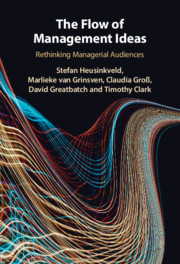Book contents
- The Flow of Management Ideas
- The Flow of Management Ideas
- Copyright page
- Contents
- Figures
- Tables
- Acknowledgements
- 1 The Flow of Management Ideas
- 2 Studying Audiences
- 3 Creating a Positive Atmosphere among the Audience
- 4 Conveying the Applicability of Ideas to Audience Members
- 5 Defining Audience Orientations
- 6 Understanding Audience Dynamism
- 7 Managerial Audiences in Organisational Contexts
- 8 Managerial Audiences and Fan Involvement
- 9 Conclusion
- Appendix A Overview of Informants
- Appendix B Glossary of Transcription Symbols
- References
- Index
5 - Defining Audience Orientations
Published online by Cambridge University Press: 22 May 2021
- The Flow of Management Ideas
- The Flow of Management Ideas
- Copyright page
- Contents
- Figures
- Tables
- Acknowledgements
- 1 The Flow of Management Ideas
- 2 Studying Audiences
- 3 Creating a Positive Atmosphere among the Audience
- 4 Conveying the Applicability of Ideas to Audience Members
- 5 Defining Audience Orientations
- 6 Understanding Audience Dynamism
- 7 Managerial Audiences in Organisational Contexts
- 8 Managerial Audiences and Fan Involvement
- 9 Conclusion
- Appendix A Overview of Informants
- Appendix B Glossary of Transcription Symbols
- References
- Index
Summary
In this chapter we ask: How and why do audience members vary in the way they are attracted to a guru and the management ideas they are promoting? Using analyses of interviews with management practitioners who have attended guru lectures, the chapter indicates how a broader and more fine-grained understanding of consumption activity is essential in providing a more advanced view of audience differentiation and helps to better understand the success and impact of management ideas among a managerial audience. First, our analysis reveals four different key managerial audience members’ consumption orientations – the gratifications that individual member seek – (devoted, engaged, non-committal and critical) towards gurus and the management ideas they are promoting. Second, the findings show how audience members’ orientations are constructed in relation to their perceptions of different key audience activities (selectivity, involvement and utility) at different stages of the consumption process. Third, the chapter explains how, and to what extent, the use of these orientations relates to the design of the guru lecture and the audience members’ background characteristics.
Keywords
- Type
- Chapter
- Information
- The Flow of Management IdeasRethinking Managerial Audiences, pp. 87 - 113Publisher: Cambridge University PressPrint publication year: 2021



